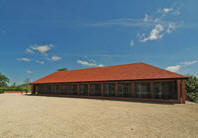

Rosehill Farm Boarding Kennels seek to provide a relaxed environment for your dogs but there are some basic rules that must be adhered to so we can ensure the safety, and health of all our customers animals.
Perhaps the most difficult health risk to deal with is Canine Infectious Tracheobronchitis or Canine Cough
commonly referred to unfortunately as "Kennel Cough"
It is more likely to be contracted at obedience classes, puppy socialisation classes, while your dog is playing with other dogs or even in a vets waiting room. In fact any environment where dogs are in social contact with others, the spreading of this condition can occur.
Sadly the available vaccinations cannot absolutely guarantee that your dog will not contract the virus. They normally however lessen the effects.
The kennel cough vaccine is not always given automatically as part of your dogs annual boosters, check with the vet
For more advice and information we recommend you contact your vet at least 14 days before boarding
Information on Canine Infectious Tracheobronchitis (kennel cough)
Canine infectious tracheobronchitis, Canine Cough, more commonly known as kennel cough, is a highly contagious multifactorial disease of a dog's respiratory tract. It occurs where dogs are in close contact with each other – puppy classes, obedience classes, shows, recreation areas, boarding kennels, rescue centres and veterinary facilities.
Who is at risk?
All dogs are at risk if they are in contact with other dogs. Kennel cough can be more severe in puppies, older dogs or debilitated individuals. It can at the extreme include fatal bronchopneumonia. Any dog which comes into contact with other dogs is at risk.
How is it spread?
Canine infectious tracheobronchitis is transmitted by coughing, sneezing or nose-to-nose contact. The disease can spread rapidly and can last up to six weeks.
Causes of kennel cough
The pathogens listed below are the main causes of kennel cough. However, there are other viruses and bacteria which may contribute to the kennel cough complex.
Bordetella bronchiseptica (Bb)
The commonest cause of kennel cough and from the same family as Bordetella pertussis (whooping cough in humans), Bb causes disease in a wide range of host species, including cats (where it is one of the causes of cat ‘flu) Bb can infect other species commonly kept in contact with dogs and therefore interspecies transmission is possible in particular between dogs and cats. Bb can be shed for up to four months post infection.
Canine parainfluenza virus (CPi)
Often found together with Bordetella bronchiseptica (Bb), CPi is present in mouth and nose secretions for up to two weeks post-infection. CPi alone can cause a mild cough and runny nose. However, the severity and duration of clinical signs are worse if CPi is in combination with Bb.
Canine adenovirus 1 and 2 (CAV-1 and CAV-2)
These two viruses are very similar, with CAV-1 the cause of infectious canine hepatitis and CAV-2 the cause of respiratory disease.
Canine herpesvirus (CHV)
Similar to herpes simplex (cold sores) and feline herpesvirus (cat ‘flu), CHV only infects canine species. Pups can be infected in the womb, or immediately after birth from the dam. In latent carriers the virus may be re-activated after stress. In puppies less than two weeks of age, it presents as ‘fading puppy syndrome’. Over two weeks of age and in adults, symptoms are usually mild respiratory signs of nasal discharge and coughing. Genital lesions may also be present.Signs and symptoms
Clinical signs include a harsh dry cough, which may cause retching; tiredness, loss of appetite and a mildly raised temperature. Very occasionally, the disease can progress to pneumonia.
Diagnosis and treatment
Swabs from the nose or throat and washings from the trachea and lower respiratory tract can be used for identification of the causative agent. Cough suppressants can help relieve symptoms. Antibacterials can also be used to help alleviate clinical disease but may not be able to eliminate infection.
Prevention and control
Vaccination is the best and easiest way to protect dogs against kennel cough, especially for dogs kept together in close proximity who are especially at risk. The Vet administered intranasal vaccine available mirrors the natural route of infection and protects for a full 12 months.
It can be given to dogs of any shape, size and age, although it gives protection to your dog in just 72 hours, it is a "live" vaccine making the recipient a carrier for up to 10 days. It is safe to use in puppies as young as three weeks of age and in pregnant bitches.
Other preventative measures include adequate hygiene and ventilation, preventing contact between animals, isolation of affected dogs and avoiding contact with cats.
We gratefully acknowledge Schering Plough Animal Health for their advice


